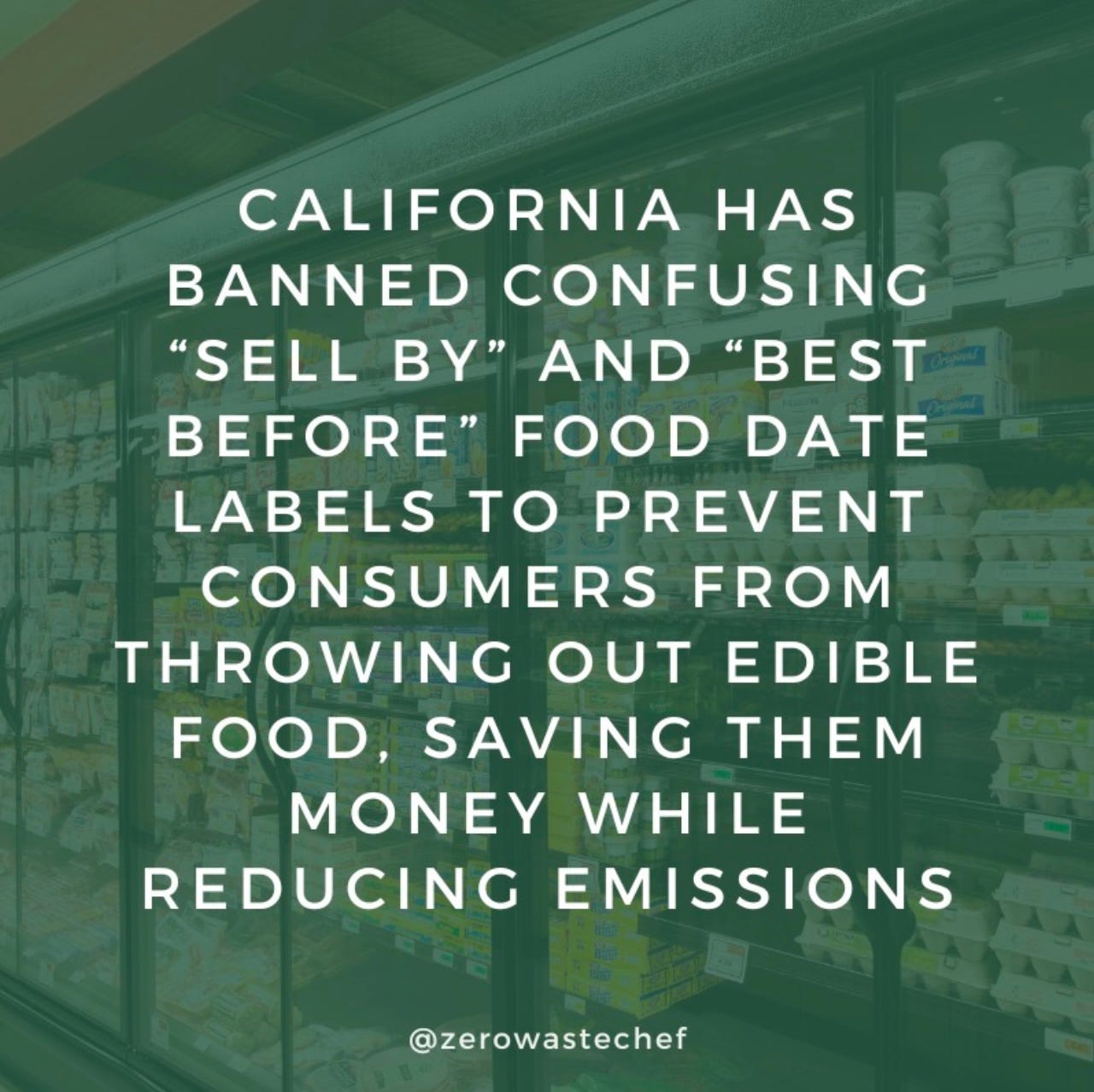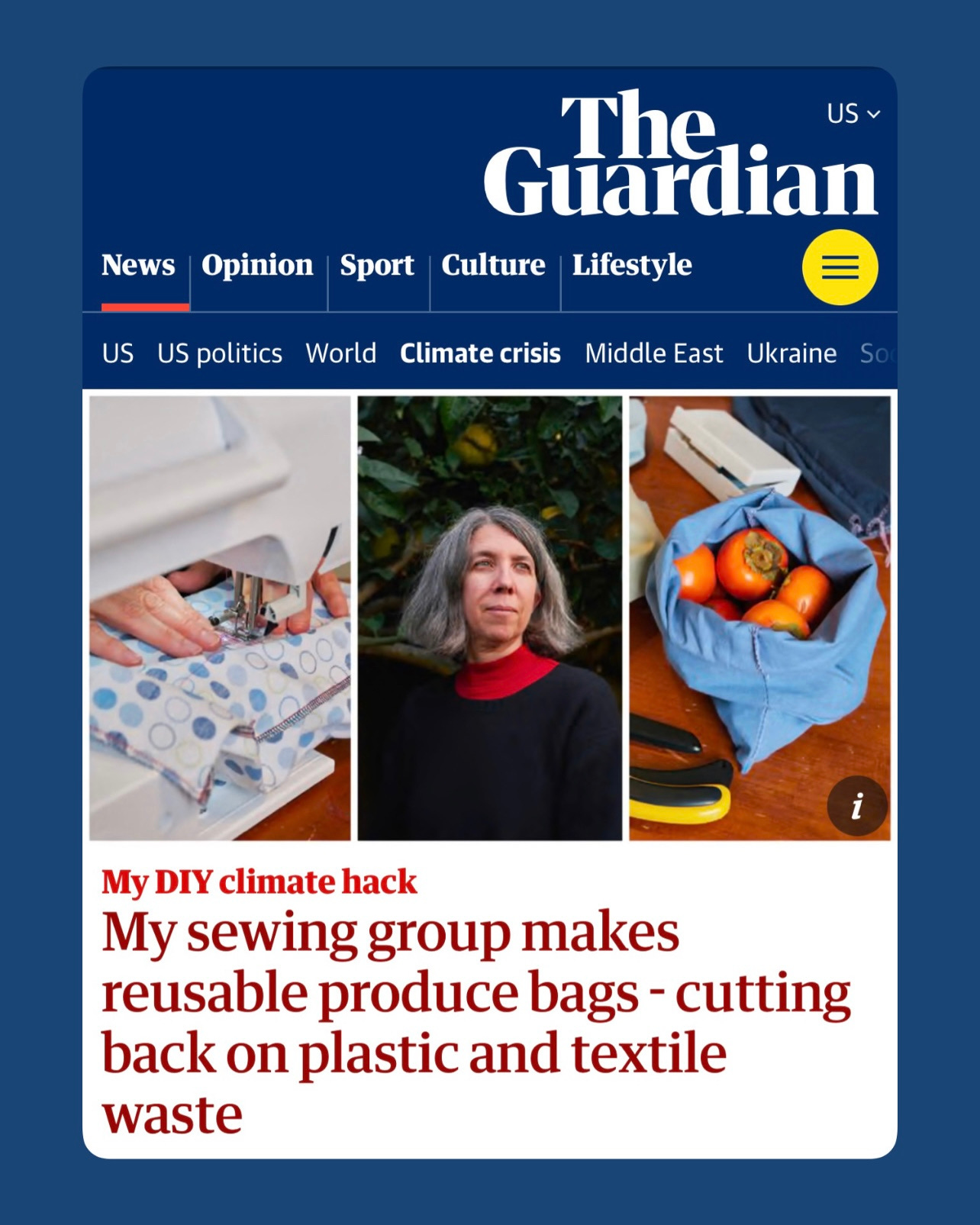If you read this newsletter, you likely avoid wasting food, you perhaps buy less stuff than most people and you probably cut some of the plastic coming into your home. I believe our individual actions (eventually) effect change at the top. And that change at the top—regulation—can bring about sweeping transformation.
Details on waste-mitigating laws that passed in my home state of California this year (or that soon go into effect) provide a bit of relief from the constant barrage of bad news that hit us in 2024 (e.g., this will be the hottest year on record). Don’t live in California? Well, keep in mind that what happens here in the world’s 5th largest economy doesn’t stay here. It has a ripple effect around the country and beyond.
Confusing Food Date Labels
Food manufacturers stamp best-before, best-by and sell-by dates on their packages to indicate when the food will be at its peak or when the grocery store should rotate it out for new stock—and not when it will suddenly kill you if you eat it. Generally unregulated, these dates do not indicate food safety. The US federal government regulates infant formula date labels only.
Confusion over these dates leads to a lot of edible food going to waste. According to a 2023 study, one in three Americans indicated they always throw out food past its “best-by” date. These consumers throw out double the amount of food as those who rarely or never throw out food based on these labels.
To cut this waste, this fall, California banned confusing food date labels such as "sell by" and "best before." Beginning in July 2026, manufacturers must use the more straightforward labels “Best if Used By” to indicate peak quality and “Use By” to indicate safety. This label reform will reduce greenhouse gas emissions caused by wasted food and save consumers money.
Read more about the label law here.
Responsible Textile Recovery Act
In October, Governor Newson signed the Responsible Textile Recovery Act, the first of its kind in the country. The law requires apparel and textile manufacturers to develop and implement systems that collect, reuse, repair and recycle all that stuff they overproduce, no matter its condition—and they'll have to pick up the tab. The program should be up and running in July 2028. (In the meantime, continue to thrift and to buy less stuff!)
In 2021, of the 1.2 million tons of textiles that were tossed in California, 95 percent were either reusable or recyclable, according to the bill's author, state Senator Josh Newman. By placing the burden on manufacturers to keep their wares out of the waste stream, the new law will no doubt spur all kinds of creative problem solving.
Pre-Checkout Plastic Bag Ban
California’s ban on single-use, pre-checkout plastic bags goes into effect on January 1st, 2025.
Plastic pollutes all along its lifecycle—from the extraction of fossils fuels to make the plastic, to refining, to manufacturing, to disposal in a landfill, incinerator or the environment. Used for produce, bulk foods, baked goods and meat, single-use plastic pre-checkout bags will be “replaced with recycled paper bags or bags considered compostable under state criteria.”
Or skip those recycled paper bags or compostable ones altogether and bring your own reusable produce bags when you shop! You can buy reusable cloth produce bags all over the place or, if you sew, make your own for practically zero dollars. I make mine out of fabric scraps and old, worn sheets (just cut around the worn, weak parts).
Learn more about the pre-checkout bag ban here.
Plastic Shopping Bag Ban
Many of us were thrilled when the state banned plastic shopping bags back in 2014. But the plastic/oil industry exploited a loophole to introduce even thicker plastic bags that customers could purchase. Thanks to a new law that passed in September, all plastic shopping bags will be banned in the golden state at grocery stores beginning in 2026, including the thick ones.
From The Guardian: "State senator Catherine Blakespear, one of the bill’s supporters, said people were not reusing or recycling any plastic bags. She pointed to a state study that found that the amount of plastic shopping bags trashed a person grew from 8lb (3.6kg) a year in 2004 to 11lb a year in 2021."
Speaking of The Guardian…
My sewing group was in the Guardian’s "My DIY Climate Hack," a series that features everyday people’s creative solutions to the climate crisis.
Every month or so, my friends and I get together to make reusable cloth produce bags out of donated fabric that may otherwise end up in a landfill. Later, we give the bags away at the farmers' market for shoppers to use instead of polluting plastic. We have so much fun doing this!
Read all about our group in the article here.
Sourdough starter class!
Saturday, January 4th, 10am PT/1pm ET. Only $9 per person! (Or per device. Have as many people sitting in front of your screen as you like.) Makes a great zero-waste gift for the bakers on your list! Go here to register.










I enjoyed your newsletter. Plastic bags. Here, in the Cleveland, OH area, back in 2020 plastic bags were to be banned from grocery stores and such. Then the Covid shutdown in March. We were not allowed to use reusable bags, so plastic bags were not banned and they still are not banned. If I remember correctly I don't think the law of banning plastic bags ever went into effect.
Great update! I've started using reusable produce bags instead of the plastic ones our stores provide.